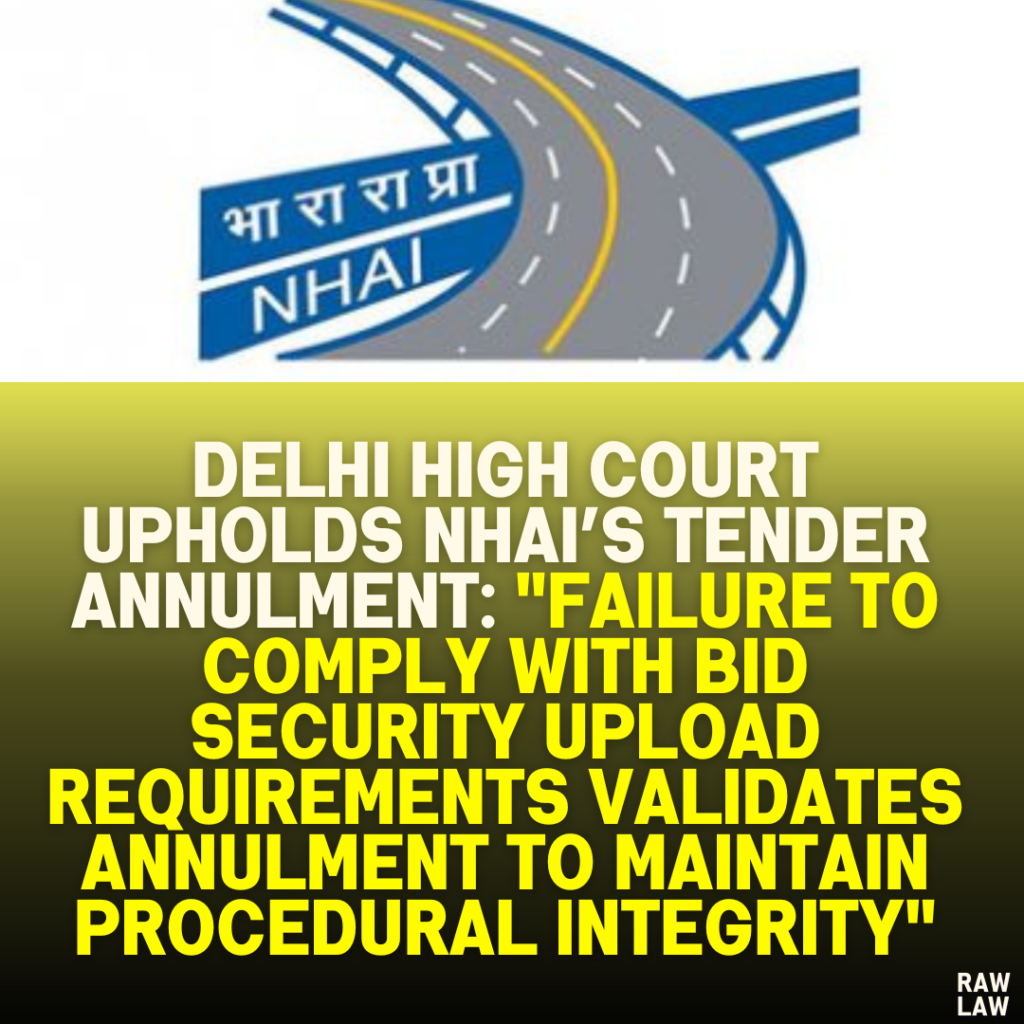Court’s Decision:
The Delhi High Court dismissed the petitioner’s challenge against the annulment of a tender issued by the National Highway Authority of India (NHAI). The court upheld the annulment, ruling that the petitioner’s failure to comply with the bid security submission requirements justified NHAI’s decision under its discretionary powers. The court emphasized that the annulment was neither arbitrary nor capricious but was rooted in a legitimate concern about procedural fairness.
Facts:
- Tender Issuance and Revision:
- NHAI issued a tender in October 2023 for a six-laning project in Madhya Pradesh under the Hybrid Annuity Mode.
- Initially, the estimated cost was set at ₹1,045.15 crores, with a bid security requirement of ₹10.45 crores.
- Through a corrigendum issued in February 2024, the cost estimate was revised to ₹1,048.65 crores, and the bid security was increased to ₹10.49 crores.
- Bid Submission:
- The petitioner submitted the original Bank Guarantee (BG) of ₹10.45 crores and later submitted an Additional Bank Guarantee (ABG) of ₹4 lakhs via the Structured Financial Messaging System (SFMS) before the revised deadline of February 27, 2024.
- However, the petitioner failed to upload the ABG on the NHAI portal, a crucial requirement for verifying the bid security.
- Disqualification and Subsequent Annulment:
- On March 4, 2024, the petitioner was initially disqualified due to the shortfall in the uploaded bid security.
- After clarifications and a review, the petitioner was declared L-1 (lowest bidder) on March 9, 2024.
- On March 14, 2024, NHAI annulled the tender process, citing concerns over procedural lapses. A fresh tender for the same project was issued the same day.
- Petitioner’s Participation in Re-tender:
- Despite challenging the annulment, the petitioner participated in the re-tender process and submitted a bid of ₹984.91 crores. The fresh L-1 bid, however, was ₹150 crores lower.
Issues:
- Was the annulment of the tender arbitrary or in violation of procedural fairness?
- Did the petitioner’s failure to upload the ABG justify the annulment?
- Was NHAI within its rights to annul the tender after declaring the petitioner as L-1?
- Could the petitioner challenge the annulment after participating in the re-tender process?
Petitioner’s Arguments:
- Procedural Compliance:
- The petitioner argued that the ABG was submitted via SFMS before the extended deadline and any non-compliance in uploading the ABG was inadvertent and minor.
- Arbitrary Annulment:
- The petitioner claimed that NHAI acted arbitrarily by annulling the tender even after declaring it L-1, alleging favoritism towards the fresh L-1 bidder.
- Transparency Concerns:
- The petitioner highlighted that its earlier bid amount of ₹861.46 crores was already disclosed, giving an undue advantage to competitors in the re-tender process.
Respondent’s Arguments (NHAI):
- Non-compliance with Bid Security Requirements:
- NHAI asserted that the petitioner’s failure to upload the ABG on its portal prevented verification of the bid security, violating Clause 2.20.6 of the RFP.
- Discretionary Powers to Annul:
- NHAI emphasized its authority under Clause 2.16.1 and Clause 6.2 of the RFP to annul the tender process without assigning reasons.
- Procedural Justification:
- The annulment was aimed at maintaining procedural integrity and avoiding future misuse of such lapses as precedents.
- Participation in Re-tender:
- NHAI argued that the petitioner’s participation in the re-tender process nullified its grievance against the annulment.
Analysis of the Law:
- Tender Conditions:
- Clause 2.20.6: Required strict adherence to bid security conditions with no scope for relaxation.
- Clause 2.16.1 and Clause 6.2: Provided NHAI with discretionary powers to annul the bidding process without liability or obligation to assign reasons.
- Judicial Precedents:
- IJM Corporation Berhad v. NHAI:
- Upheld NHAI’s right to annul tenders under similar discretionary clauses.
- Emphasized that participation in a fresh tender process undermines challenges to previous annulments.
- Subodh Kumar Singh Rathour v. CEO:
- Distinguished as the annulment in that case occurred after awarding the contract, unlike the present case where it occurred pre-award.
- IJM Corporation Berhad v. NHAI:
- Principles of Fairness:
- The court affirmed that public authorities are bound to act fairly and transparently, even in commercial matters, but found NHAI’s actions to be reasonable and justified in this instance.
Court’s Reasoning:
- Non-compliance Justified Annulment:
- The petitioner’s failure to upload the ABG constituted a material procedural lapse, making verification impossible.
- Accepting such lapses could set a dangerous precedent for future bidders.
- Procedural Integrity:
- The annulment ensured procedural fairness and protected the tendering process from potential misuse.
- Discretionary Authority:
- NHAI’s discretionary powers under the RFP were lawfully exercised and supported by cogent reasons.
- Petitioner’s Participation in Re-tender:
- By participating in the re-tender, the petitioner implicitly accepted the annulment and undermined its own challenge.
Conclusion:
The court dismissed the petition, finding NHAI’s annulment of the tender to be lawful and justified. It held that the petitioner’s failure to comply with essential bid security requirements warranted the annulment, and NHAI acted within its rights under the RFP.
Implications:
- Reinforcement of Procedural Compliance:
- The judgment emphasizes the need for strict adherence to bid conditions in public procurement processes.
- Discretionary Powers of Authorities:
- Reaffirms the authority of public bodies to annul tenders to maintain procedural integrity and fairness.
- Challenging Re-tender Participation:
- Highlights the legal risks for bidders who challenge annulments but simultaneously participate in re-tenders.




Pingback: Jammu & Kashmir High Court Revives Complaint Dismissed During COVID-19: “Mechanical Dismissals Without Considering Pandemic Challenges Violate Procedural Fairness” - Raw Law